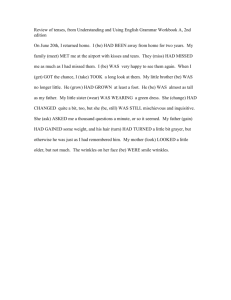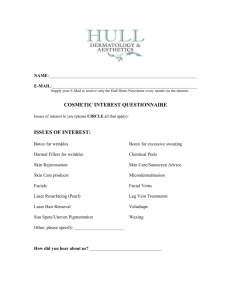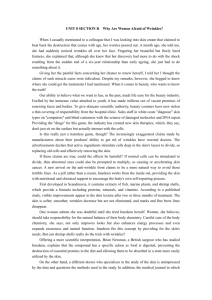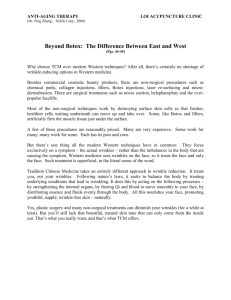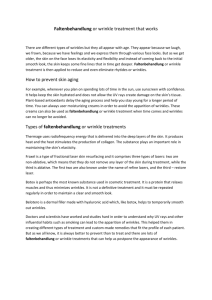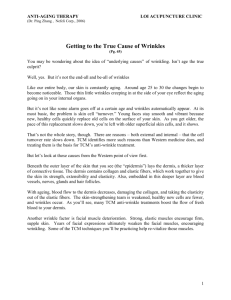Where People Live
advertisement
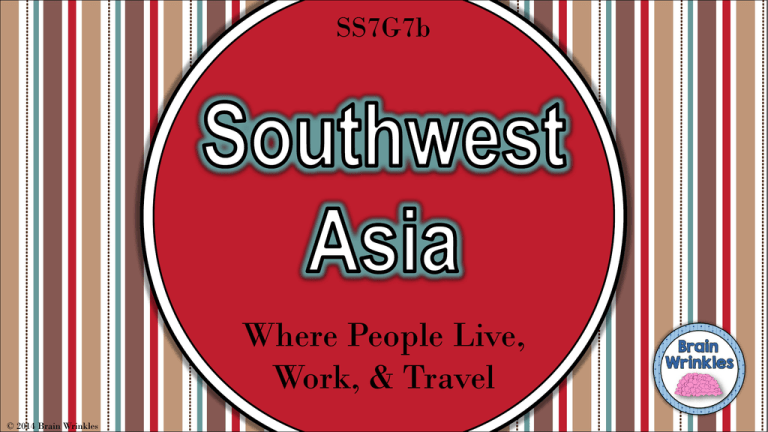
SS7G7b Where People Live, Work, & Travel © 2014 Brain Wrinkles Standards SS7G7 The student will explain the impact of location, climate, physical characteristics, Distribution of natural resources and population distribution on Southwest Asia (Middle East). b. Describe how the deserts and rivers of Southwest Asia (Middle East) have affected the population in terms of where people live, the type of work they do, and how they travel. © 2014 Brain Wrinkles Directions: Complete the chart below while discussion the presentation. Description Deserts Rivers © 2014 Brain Wrinkles Where People Live Where People Work How People Travel Directions: Complete the chart below while discussion the presentation. Description Where People Live Where People Work How People Travel Most of SW Asia is covered in desert Many people have moved out of the deserts & into cities in the past 50 years; Some Bedouins (nomads) still live there; food and water are scarce Bedouins are animal herders—trade animals and hand-made goods; most people left desert life behind and moved to cities for work Camel caravans; ATVs Tigris River, Euphrates River, Jordan River Most people live in cities that are built around water sources (rivers); rivers provide water for drinking and bathing, irrigation for crops, and food (fish) Many people work in factories or shipping industry in cities along rivers; farmers grow crops in river valleys Boats Deserts Rivers © 2014 Brain Wrinkles © 2014 Brain Wrinkles Live Work Travel © 2014 Brain Wrinkles Live Work Travel © 2014 Brain Wrinkles • There are 2.8 million miles of land in the Middle East, and a large number of it is covered by large desert areas. • The Rub al-Khali (or “empty quarter”) is in southern Saudi Arabia. • The Great Syrian Desert is located between Syria and Iraq. © 2014 Brain Wrinkles © 2014 Brain Wrinkles • The desert areas are not a favorable place to live due to the extremely hot and arid climate. • Food and water is difficult to find; however, oases provide a temporary water source. • Bedouins (desert nomads) have called the desert home for thousands of years. • They live in tent camps and in huts. © 2014 Brain Wrinkles © 2014 Brain Wrinkles • Since the discovery of oil, most people have moved away from the desert areas. • Over the last 50 years, residents have been exchanging the harsh nomadic life for work in the cities. • In Saudi Arabia, only about 1% of the population remains as nomadic herders. © 2014 Brain Wrinkles © 2014 Brain Wrinkles • Many Bedouins are sheep, camel, and goat herders. • They trade animals and hand-made goods with people who live in towns along the desert’s edge. • Most people have left the desert behind and have moved to cities to find work. © 2014 Brain Wrinkles © 2014 Brain Wrinkles • People travel across the desert in camel caravans. • Some even use All Terrain Vehicles (ATVs) to maneuver across the sand. © 2014 Brain Wrinkles © 2014 Brain Wrinkles © 2014 Brain Wrinkles • The Tigris River runs through Turkey and Iraq and joins with the Euphrates to become the Shatt al Arab, which empties into the Persian Gulf. • The Euphrates River runs through Turkey, Syria, and Iraq. • The Jordan River forms part of the border for Syria, Jordan, and Israel. © 2014 Brain Wrinkles © 2014 Brain Wrinkles • Cities are built near rivers to take advantage of the scarce water sources in Southwest Asia. • Access to water for bathing and drinking make the area much easier to live in. • Farmers grow crops by rivers and in river valleys because they provide a source of irrigation. • Rivers also provide a good source of food (fish). © 2014 Brain Wrinkles Baghdad, Iraq & the Tigris River © 2014 Brain Wrinkles • Cities and towns on rivers have become major hubs of industry. • Most people in these cities make a living working in industrial factories. • Rivers are also important trade routes for people in cities to use to ship goods to other merchants. • Farming and fishing are also important areas of income for people who live near rivers. © 2014 Brain Wrinkles Al Aqaba, Jordan & the Jordan River © 2014 Brain Wrinkles • Rivers have always provided important routes for transportation. • People use boats for travel and trade along rivers. © 2014 Brain Wrinkles © 2014 Brain Wrinkles Teacher Info – Venn Diagram • Have the students compare and contrast how people use deserts and rivers to live, work, & travel on the Venn diagram. © 2014 Brain Wrinkles Deserts © 2014 Brain Wrinkles Compare and Contrast Rivers Directions: Design a plate that could be used in a Middle Eastern restaurant. The plate’s design should include key symbols that relate to how people live, work, and travel along the rivers and deserts in Southwest Asia. In the textbox, you will explain your plate’s design and the significance of the symbols. Plate’s Description: © 2014 Brain Wrinkles Wouldn’t it be awesome to take a fieldtrip to visit the deserts and rivers of Southwest Asia? Write me a note to try and convince me to take your class there. Include at least THREE reasons based on where people live, work, and travel. Also, draw an illustration to go with your note. Wouldn’t it be awesome to take a fieldtrip to visit the deserts and rivers of Southwest Asia? Write me a note to try and convince me to take your class there. Include at least THREE reasons based on where people live, work, and travel. Also, draw an illustration to go with your note. From the Desk of… © 2014 Brain Wrinkles From the Desk of… © 2014 Brain Wrinkles
